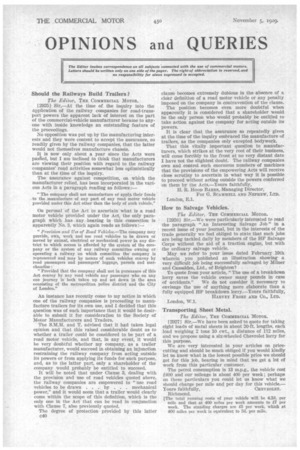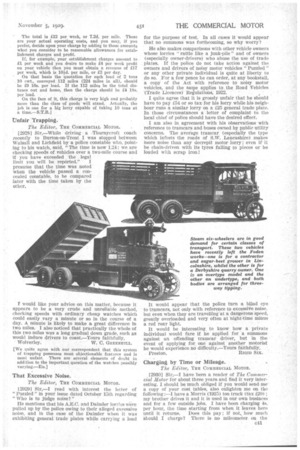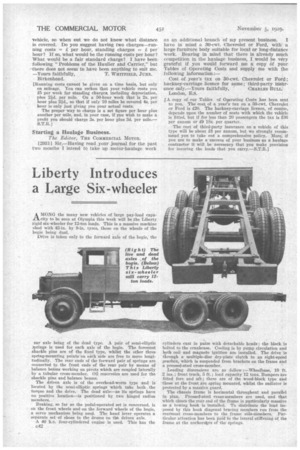OPINIONS and QUERIES Should the Railways Build Trailers ?
Page 170

Page 171

Page 172

If you've noticed an error in this article please click here to report it so we can fix it.
The Editor, THE COMMERCIAL MOTOR.
[2925] Sir,—At the time of the inquiry into the application of the railway companies for road-transport powers the apparent lack of interest on the part of the commercial-vehicle manufacturer became to anyone with inside knowledge an outstanding feature of the proceedings.
No opposition was rait up by the manufacturing interests and they were content to accept the assurance, SO readily given by the railway companies, that the latter would not themselves manufacture chassis.
It is now only about a year since the Acts were pasged, but I am inclined to think that manufacturers are viewing their position with regard to the railway companies' road activities somewhat less optimistically than at the time of the inquiry.
The assurance against competition, on which the manufacturer relied, has been incorporated in the various Acts in a paragraph reading as follows :—
"The company shall not manufacture or apply. their funds to the manufacture of any part of any road motor vehicle provided under this Act other than the body of such vehicle."
On perusal of the Act to ascertain what is a road motor vehicle provided under the Act, the only paragraph which has . any bearing in this connection is apparently No. 3, which again reads as follows :—
" Provision and Use of Road Vehides.—The company may provide, OWD, work and use road vehicles to be drawn or moved by animal, electrical or mechanical. power in any district to which access is afforded by the system of the company or the system of any railway committee owning or operating a railway on which committee the company is represented and may by means of such vehicles convey by road passengers and passengers' luggage, parcels and merchandise:
" Provided that the company shall not in pursuance of this Act convey by any road vehicle any passenger who on any one journey is both taken up and set down in the area consisting of the metropolitan police district and the City of London."
An instance has recently come to my notice in which one of the railway companies is proceeding to manufacture trailers for its own use, and I decided that this question was of such importance that it would be desirable to submit it for consideration to the Society of Motor Manufacturers and Traders.
The S.M.M. and T. advised that it had taken legal opinion and that this raised considerable doubt as to whether a trailer could be considered to be part of a road motor vehicle, and that, in any event, it would be very doubtful whether my company, as a trailer manufacturer, would succeed in obtaining an injunction restraining the railway company from acting outside its powers or from applying its funds for such purpose, and, as to the latter part, only a shareholder of the company would probably be entitled to succeed.
It will be noted that under Clause 3, dealing with the provision and use of road vehicles quoted above, the railway companies are empowered to "use road vehicles to be drawn . . by . . . mechanical power," and it would seem that a trailer would clearly come within the scope of this definition, which is the only one in the Act that can be read in conjunction with Clause 7, also previously quoted.
The degree of protection provided by this latter e40 clause becomes extremely dubious in the absence of a clear definition of a road motor vehicle or any penalty imposed on the company in contravention of the clause.
The position becomes even more doubtful when apparently it is considered that a shareholder would be the only person who would probably be entitled to take action against the company for acting outside its powers.
It is clear that the assurance so repeatedly given at the time of the inquiry embraced the manufacture of trailers, as the companies only excepted bodywork.
That this vitally important question to manufacturers, which strikes at the very root of their business, will come forcibly to the front at no very distant date I have not the slightest doubt. The railway companies own and control such enormous numbers of machines that the provisions of the empowering Acts will receive dose scrutiny to ascertain in what way it is possible to proceed without acting outside the powers conferred on them by the Acts.—Yours faithfully,
H. R. HOOD BARES, Managing Director,
For G. SCAMMELL AND NEPHEW, LTD.
London, El.
How to Salvage Vehicles.
The Editor, THE COMMERCIAL MOTOR.
[2926] Sir,—We were particularly interested to read the paragraph "An Interesting Salvage Job" in a recent issue of your journal, but in the interests of the trade generally we feel obliged to state that such jobs are being tackled daily by members of the HF Salvage Corps without the aid of a traction engine, but with the ordinary salvage vehicle.
May we refer to your issue dated February 19th wherein you published an illustration showing a very difficult job being successfully salvaged by Milner and Casselden, Ltd.; of Brighton?
To quote from your article, "The use of a breakdown lorry saves the vehicle owner many pounds in ease of accidents." We do not consider it necessary to envisage the use of anything more elaborate than a fully equipped HF breakdown lorry.----Yours faithfully, HARVEY FROST AD CO., LTD, London, W.1.
Transporting Sheet Metal.
The Editor, THE COMMERCIAL MOTOR.
[29271 Sir,—We have been asked to quote for taking eight loads of metal sheets in about 20-ft. lengths, each load weighing 2 tons 10 cwt., a distance of 112 miles, and we propose using a six-wheeled Chevrolet lorry for this purpose.
We are very interested in your articles on pricecutting and should be much obliged if you would kindly let us know what is the lowest possible price we should get for this job, bearing in mind that we get a lot of work from this particular customer.
The petrol consumption is 13 m.p.g., the vehicle cost 1400 and our mileage is about 400 per week ; perhaps on these particulars you could let us know what we should charge per mile and per day for this vehicle.— Yours faithfully, CHEVROLET. Richmond.
[The total running costs of your vehicle will be 4.20. per mile and that at 400 miles per week amounts to 17 per week. The standing charges are £5 per week, which at 400 miles per week is equivalent to 3d. per mile.
The total is £12 per week, or 7.2d. per mile. These are your actual operating costs, and you may, if you prefer, decide upon your charge by adding to those amounts what you consider to be reasonable allowances for establishment charges and profit.
If, for example, your establishment charges amount to £1 per week and you desire to make £4 per week profit on your vehicle then you must obtain a revenue of 117 per week, which is 101d, per toile, or £3 per day.
On that basis the -quotation for each load of 2 tons 10 cwt., conveyed, 112 miles (224 miles in all), should be £9 16s. per load. If the 112 miles be the total distance out and home, then the charge should be 14 18s. per load. On the face a it, this charge is very high and probably more than the class of goods will stand. Actually, the job is one for a big lorry capable of taking 10 tons at
time.—S.T.R.1
'Unfair Trapping.
The Editor, TEE COMMERCIAL Moron.
• [29281 Sir,—While driving' a Thornycroft coach recently to Burton-on-Trent I was stopped between Walsall_ and Lichfield by a police constable who, pointing to his watch, said, " The time is now L24; we are
• checking speeds of vehicles over a two-mile course and if you have exceeded the legal limit you will be reported." I presume that the time was noted when the vehicle passed a concealed constable, to be compared later with the time taken by the other, I would like your advice on this matter, because it appears to be a very crude and . unreliable method, checking speeds with ordinary cheap watches which could easily ,vary a minute or so in the course of a day. A minute is likely to make a great difference In two miles.I also noticed that practically the whole of this two miles was a long gradual down grade, such as would induce drivers to coast,—Yours faithfully,
Wolverley: W. C. GREENHILL.
[We quite agree with our correspondent that this system of trapping possesses most objectionable features and is most unfair. There are several elements of doubt in addition to the important question of the watches possibly varying.—ED.] That Excessive Noise.
'The Editor, THE COMMERCIAL MOTOR.
[29291 Sir,—I read with interest the letter of "Puzzled in your issue dated October 15th regarding "Who is to judge noise?"
Ile mentions that his A.E.C. and Daimler lorries were pulled up by the police owing to their alleged excessive noise, and in the case of the Daimler when it was exhibiting general trade plates while carrying a load for the purpose of test. In all cases it 'would appear that no summons was forthcoming, so why worry?
He alSo makes comparisons with other vehicle owners whose lorries "rattle like a junk-pile" and of owners
• (especially owner-drivers) who abuse the use of trade plates. If the police do not take action against the owners and drivers of noisy motor vehicles "Puzzled " or any• other private individual is quite at liberty to do so. For a few pence he can order, at any bookstall, a copy of the 'Act with reference to noisy motor vehicles, and the saTe applies to. the Road Vehicles '(Trade Licences) Regulations,' 1922;•
I quite agree that it is grossly unfair that he should have to pay £54 or so tax for his lorry while his-neighbour runs a similar lorry on a £25 general trade plate. In those circumstances a letter of complaint to the local chief of police should have the desired effect. • I am also in agreement with his observations with reference to tramcars and buses owned by public utility concerns. The average tramcar (especially the type which infests the roads of S.W.. Lancashire) makes More noise than any decrepit motor lorry ; even if it be chain-driven with its tyres falling to pieces or be loaded with scrap iron!
It would appear that the police turn a blind eye to tramcars, not only with reference to excessive noise, but even when they are travelling--at a dangerous speed, greatly overloaded and very often at night-time Minus
a red rear light. .
It would be interesting, to know how a private individual would fare if he applied for a Summons against an offending tramcar driver, but in the event of applying far, one against another motorist he would experience nd difficulty.--Yours faithfully, • Preston, RIGID SIX.
Charging by Time or Mileage.
The Editor, THE COMMERCIAL MOTOR.
r2930] Sir,—I have been a reader of The Commercial Motor for about three years and find it very interesting. I should be-much obliged if you would send-mea copy of your cost tables, also enlighten me on the following have a Morris (.1925) ton truck (tax £20) ; my brother drives it and it is used in our own business, and for a few outside jobs. I have been charging 4s. per hour, the time starting from when it leaves, hero
until it returns. Does this pay ; if not,, how much Should I charge? There is no mileometer. on the vehicle, so when out we do not know what distance is covered. Do you suggest having two charges—running costs = £ per hour, standing charges — £ per hour? If so, what would be the running costs per hour? What would be a fair standard charge? I have been following " Problems of the Haulier and Carrier," but there does not seem to have been anything to suit me.
—Yours faithfully, T. -WHITFIELD, JUNR.
• Birkenhead.
[Running costs cannot be given on a time basis, but only on mileage. You can reckon that your vehicle costs you 15 per week for standing charges including depreciation, plus 21d. per mile. On a 50-hour week that is 2s. per hour plus 211., so that if only 10 miles be covered 4s. per hour is only just giving you your actual costs.
The proper way to charge is a set figure per hour plus another per mile, and, in your case, if you wish to make a profit you should charge 3s. per hour plus 3d. per mile.S.T.R. j
Starting a Haulage Business.
The Editor, THE COMMERCIAL MOTOR.
[29311 Sir,—Having read your journal for the past two months I intend to take up motor-haulage work
as an additional branch of my present business. I have in mind a 30-cwt. Chevrolet or Ford, with a large furniture body suitable for local or long-distance work. Bearing in mind that there is already much competition in the haulage business, I would be very grateful if you would forward me a copy of your Tables of Operating Costs and supply me with the following information:—
Cost of year's tax on 30-cwt. Chevrolet or Ford; hackney-carriage licence for same; third-party instr
ance only.—Yours faithfully, r CrtAuts•BuLL; London, as.
.IA copy of our Tables of Operating Costs has been sent to you. The cost of a year's tax on a 80-cwt. Chevrolet or Ford is 120. The hackney-carriage licence, of course, depends upon the number of seats with which the vehicle is fitted, but if for less than 20 passengers the tax is /36 per annum or £9 18s. per quarter.
The cost of third-party insurance on a vehicle of this type will be about £8 per annum, but we strongly recommend you to take out a comprehensive policy. More if you are to make a success of your business as a haulage contractor it will he necessary that you make provision for insuring the loads that you carry.—S.T.B.]




































































































































































































































































